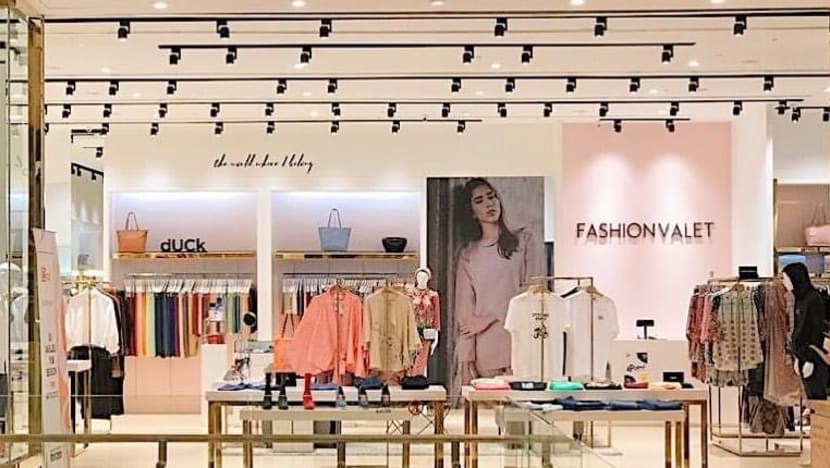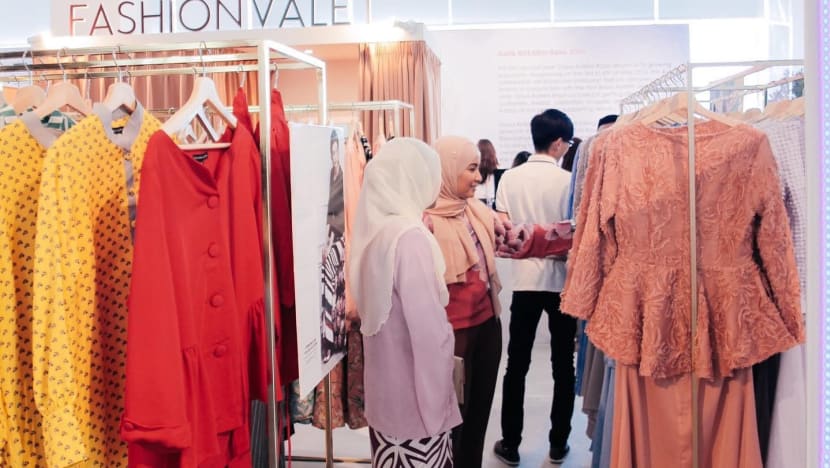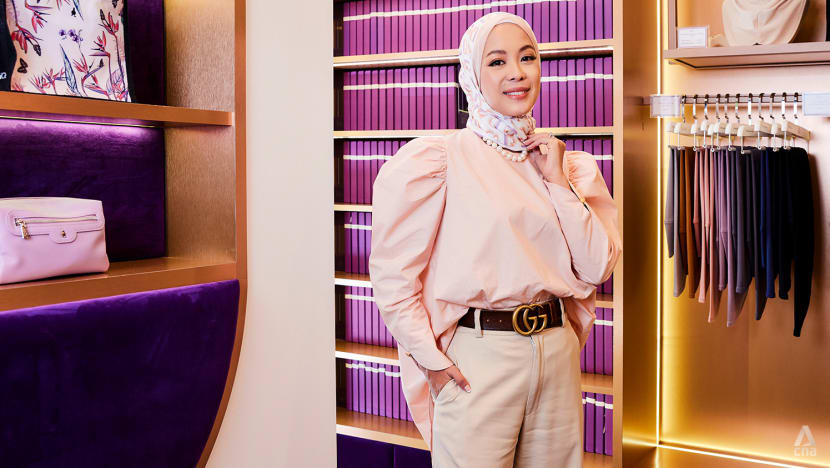What is the controversy behind FashionValet’s founders and why is the Malaysian firm under probe?
The Malaysian Anti-Corruption Commission (MACC) had frozen personal and company bank accounts linked to FashionValet’s co-owner Ms Vivy Yusof and seized 11 handbags and a luxury watch worth approximately RM200,000 as part of its probe.

A FashionValet store at Pavilion mall in Kuala Lumpur, which closed down in February 2020. (Photo: Facebook/FashionValet.com)
KUALA LUMPUR: Malaysia’s fashion e-commerce platform FashionValet has come under intense scrutiny of late amid allegations of funds mismanagement by its co-founders.
The spotlight is on entrepreneur Vivy Yusof and her husband, Mr Fadzarudin Shah Anuar, who founded the firm in 2010. Amid a probe by the authorities into the firm’s books, netizens have also volleyed criticisms against Ms Vivy for her alleged spending habits and lavish lifestyle.
The Ministry of Finance said in a written parliamentary reply on Oct 28 that two government-linked firms - Khazanah Nasional and Permodalan Nasional Berhad (PNB) - had sold their minority investments in FashionValet at the end of 2023 for RM3.1 million (US$707,400).
This marked a significant loss from the initial RM47 million investments in 2018, prompting calls for investigations as it involves public money.
On Thursday (Nov 7), the Malaysian Anti-Corruption Commission (MACC) confirmed that it found several suspicious transactions made to a company linked to the founding partner of FashionValet from 2018 until last year, though it did not specify who.
“We looked at the flow of financial sources and the reasons for entry and where the money is spent to see if there are elements of corruption or other offences involving fraud.
“However, we believe that there are some investments that have been misused in this matter, which we are identifying,” MACC’s chief commissioner Azam Baki told local media.
CNA takes a closer look at the controversy surrounding FashionValet amid what appears to be a fall from grace for its high-profile co-founders.

WHAT IS FASHIONVALET?
Established in 2010 by Ms Vivy and her husband, FashionValet is a curated e-commerce platform retailing stylish yet modest fashion designed by Malaysian local brands that it says caters to the modern Muslim women.
Over the years, it has become one of Malaysia’s leading e-commerce platforms and a key player in the country’s fashion and retail sector, offering over 400 brands and 15,000 products, according to local media. The platform touts itself as a marketplace for homegrown fashion labels to reach a wider audience.
With the popularity of online shopping in Southeast Asia, the brand then expanded its reach to other markets in the region including Singapore, Indonesia and Brunei.
At its peak, FashionValet operated five brick-and-mortar stores, including in upscale shopping malls in Kuala Lumpur like Pavilion, Bangsar Village and IOI City Mall.
It had also opened an outlet at Orchard Road in Singapore which has since been shuttered.
In 2022, amid rising competition and other business challenges during the COVID-19 pandemic, Ms Vivy and her husband announced the shutdown of FashionValet’s e-commerce platform, pivoting instead to focus on their own in-house modest brands, dUCK and Lilit.
According to local news outlet Malay Mail, there have been allegations that FashionValet heavily promoted its own two brands at the expense of other local vendors that used its platform to sell their products, even as the firm marketed itself as a business model around promoting local entrepreneurs.
Malay Mail also reported that announcements of FashionValet’s closure of its e-commerce platform in 2022 had raised eyebrows on how a firm that was recording million-dollar losses could convince two of the country’s largest state investment funds - Khazanah and PNB - to inject money into a declining business.
As reported by various local media on Nov 4, FashionValet had also recorded losses for five consecutive years prior to the two funds’ investment.
A check of financial account filings of the company with the Companies Commission of Malaysia between 2012 and 2017 by the New Straits Times showed that FashionValet’s losses had grown from RM166,793 in 2012 to RM10.7 million in 2017, even before Khazanah and PNB’s investment in the company in 2018.
And in 2018, when Khazanah and PNB invested in the company, FashionValet had already recorded a net loss of RM20.19 million.
“(We) can’t just hand out huge sums of money and allow unaccountable spending under the guise of high-risk investment,” Member of Parliament for Kuching Kelvin Yii said on X, highlighting that there had been red flags in FashionValet’s funding since the start.

THE WOMAN BEHIND THE BRAND
Public attention on FashionValet’s alleged mismanagement could also be attributed to the founder’s social media presence, with blogger-turned-entrepreneur Ms Vivy having over 1.8 million followers on Instagram.
Ms Vivy, 36, was the creative director of FashionValet, while her husband was the chief executive officer. Both have resigned from their positions as of Nov 1.
A prominent figure in Malaysia’s fashion and business sector, Ms Vivy had starred in her reality television series - Love,Vivy - and authored the book “The First Decade: My Journey from Blogger to Entrepreneur” that was published in 2022.
She has also been awarded accolades, including a place on Forbes’ 30 under 30 Asia list and Young Entrepreneur of the Year at the Asean@50 Achievement Awards in 2017.
As the downfall of her business venture spirals into a nationwide scandal, Ms Vivy’s lavish and luxurious lifestyle has come under the spotlight.
Social media posts of her luxury bag and shoe collection posted by Ms Vivy in the past under the hashtags “#crazybaglady” and “#eachofthemhasastory” - which have since been deleted - have gone viral on social media.
Some netizens have also volleyed criticisms against Ms Vivy for portraying a luxurious lifestyle despite her company not doing well.
“Vivy has SIX Dior saddle bags that cost RM19,000 each, at least SIX Lady Dior handbags that cost between RM28,000 to RM30,000 each … For Hermes (bags), she has one Hermes Constance worth RM60,000 and TWO Herbag, worth US$3,050 each,” a netizen with the username @frhhh8989 posted on X on Nov 3, with the post garnering over 7,900 reposts and 15,000 likes as of Nov 8.
The public figure is however not new to controversies in Malaysia.
A 2021 research paper by linguistics lecturers at the International Islamic University of Malaysia analysing Ms Vivy’s use of “humblebragging language” has also circulated on social media.
And in 2018, local media had reported that Ms Vivy came under fire for a post on her Instagram story regarding the use of counterfeit dUCK prayer garments or telekung used by Muslims.
“We wear scarves for religion, be a good Muslim and don’t support fake ripoff products, I cannot brain (imagine) how people can even buy fake telekung to pray also,” she posted, along with a picture showing counterfeit products of her luxury lifestyle brand dUCK.
Ms Vivy has clarified her stance, stating that she was not criticising those who use cheap products for prayers, but rather she was opposing those who support counterfeit products.
But aside from the controversy, Ms Vivy had also done a number of notable charity efforts to help frontliners and the less privileged.
In 2020, her crowdfunding initiative - FV COVID19 Support Fund for medical frontliners combating the COVID-19 pandemic in Malaysia - raised RM1.14 million.
WHAT DO WE KNOW ABOUT THE CASE SO FAR?
According to the Malay Mail, the FashionValet controversy began in September after a report by a tech newsletter stating that the company had been sold by Khazanah and PNB in a “fire sale” to local investment firm NXBT Partners, another investment holding company.
In 2018, Khazanah invested RM27 million while PNB invested RM20 million into FashionValet.
"The total loss from the sale of FashionValet shares is negligible compared to Khazanah’s and PNB’s overall income for the relevant year," the finance ministry said in its written reply on Oct 28.
The ministry had said earlier in September that the investment was in line with the sovereign wealth fund’s mandate at the time to promote local tech entrepreneurs and enable them to gain exposure in the growing e-commerce sector.
Following public backlash regarding the investment loss, the founders of the company - Ms Vivy and Mr Fadzarudin - announced their resignations from their respective roles on Nov 1.
“We take full responsibility for the failure of the investment … We are disappointed in ourselves and regretful that it has come to this … we are very sorry for the controversy this has caused Khazanah and PNB,” read the statement that was posted on Instagram.
Meanwhile, FashionValet’s director Aireen Omar has weighed in on the saga during a podcast released on Nov 1, rejecting allegations of fraud and abuse and even asking netizens to “have a life”.
“No such thing as scandal or fraud or syphoning of money. Not at all! I mean, I sit on the board and look at the numbers and definitely, there is no such thing,” she told the hosts of the “Apa Cerita Podcast”.
“Maybe they (netizens) should have a life … It is a natural thing that happens in any business. There will be ups and downs, right,” said Ms Aireen, who is also the president of Capital A, the parent company of AirAsia.
On Nov 2, Prime Minister Anwar Ibrahim, who is also the Finance Minister, ordered Khazanah to conduct an audit following the loss.
Mr Anwar, who is also the chairman of Khazanah, said the directive is in line with his earlier mandate for the National Audit Department to assess over 2,000 government-linked companies.

The Malaysian Anti-Corruption Commission then confirmed on the same day through a media statement that investigations are ongoing.
This is followed by a video posted by MACC showing its raid on the offices of the FashionValet on Nov 4, which raised scepticism among some netizens, though others expressed support for the agency's move.
“This investigation is important as it is of public interest,” the spokesperson added in the video that has since garnered over 537,200 views as of Nov 8.
The anti-graft busters also confirmed that the case is being investigated under Section 18 of the MACC Act in 2009 which deals with the submission of false claims that can carry a maximum prison sentence of 20 years and a fine of RM10,000 or five times the value of the false claims, whichever is higher upon conviction.
On Nov 6, local media reported that MACC had seized 11 handbags and a luxury watch worth approximately RM200,000 during a raid at the couple’s home in Mont Kiara, Kuala Lumpur.
Several personal and company bank accounts valued at around RM1.1 million belonging to the husband-and-wife had also been frozen, as reported by the Malay Mail.
“Khazanah is under the Malaysian government, Malaysians have the right to know about the millions of losses, Vivy Yusof and her husband can’t just announced their resignation and leave things as it is, we want an explanation of where the money went and why it has been used so irresponsibly,” X user @miss_rights posted on Nov 1, which has seen 4,000 reposts.















